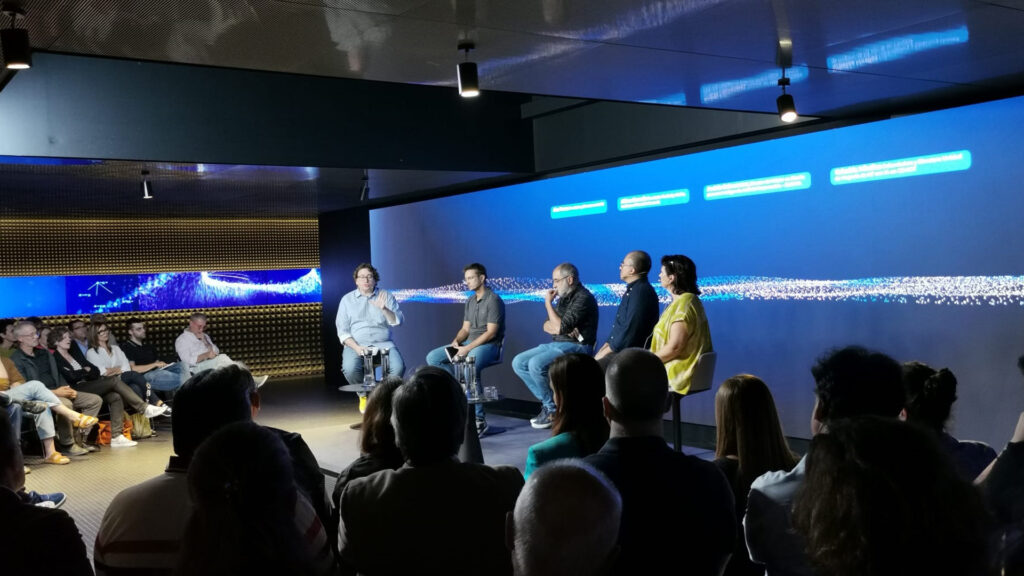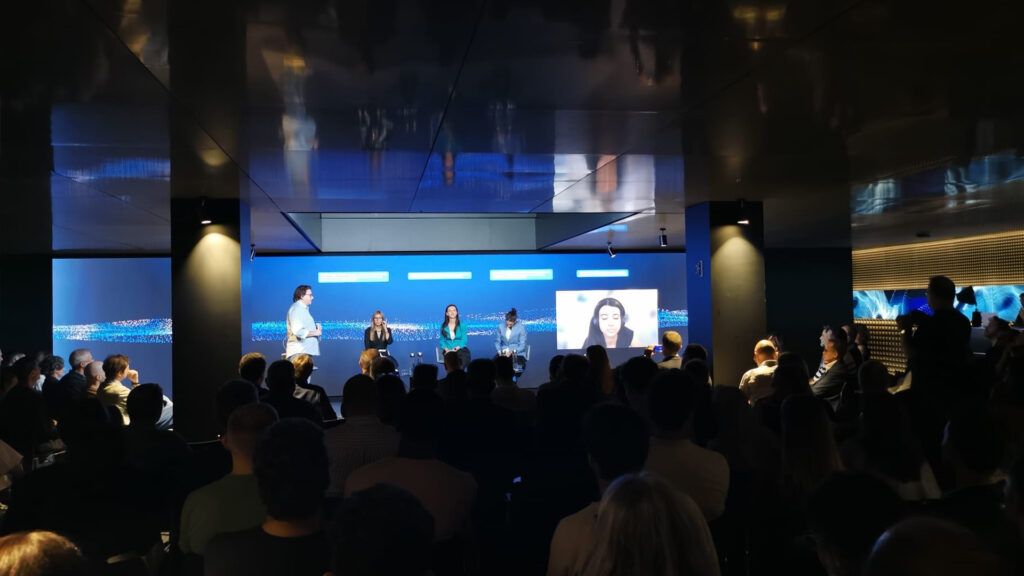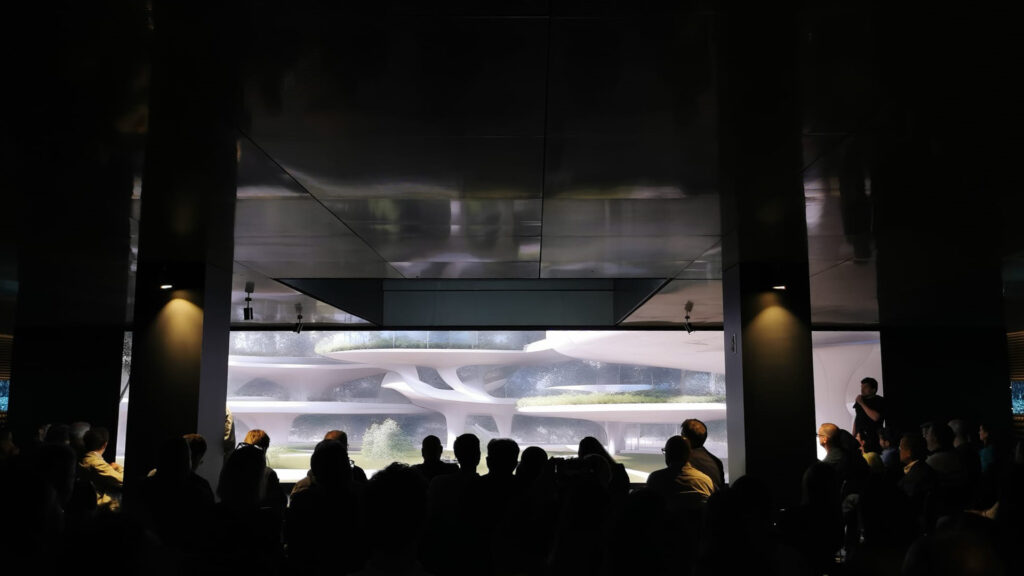Artificial Intelligence under debate: how will it influence design and architecture?
How will Artificial Intelligence influence the world of education and how will it change the architecture, design and construction of spaces? On 17 October, Roca Barcelona Gallery hosted the talk “AI Visions: Artificial Intelligence under debate” to better understand what this disruptive technology is and the challenges it poses in the present. Roca and Arquitectes per l’Arquitectura, in collaboration with the companies Unifit and Elia, organised a first meeting with the collaboration of universities such as UIC Barcelona, laSalle and Elisava.
The appearance of ChatGPT, based on AI, a year ago in open and free mode has generated many questions about its use. Should we understand AI as a tool that will make us faster and more efficient? Or should we see it as a threat? According to Miquel Ángel Julià Hierro, Concept Architect and Director of Design and Marketing at Grup Idea, which commissioned the sessions, AI “will mark a before and after in how we use our Natural Intelligence from now on”. “We are no longer talking about a new Industrial Revolution but a true Cognitive Revolution,” he said.
The aim of two round tables was to deepen knowledge about artificial intelligence (AI) with the help of experts in the field. The first round table dealt with the implications of AI in education, both in student management, predictions, statistics and connections throughout the community, as well as the use of this tool in teaching. The second session, focused on design, discussed how the use of AI can influence the ideation of creative processes and also the user experience.
Training in Artificial Intelligence, a must in education and business
The field of education has undergone structural changes in recent decades. Now, AI poses unprecedented challenges in the education sector with impacts that are difficult to calculate in comparison with the irruption of the internet. To assess these aspects, experts in the sector took part in the round table, such as Alex Torras, founder and director of Unifit, Andrés Colmenares, head of the Master’s in artificial intelligence at Elisava, Alfons Cornella, founder of Curiosity Atelier, Institute of Next and Infonomia, and Griselda Miralles, co-founder and director of an IoT business unit with AI at CD4IOT.

For Alex Torras, creator of the saas (software as a service) platform Unifit, which seeks to digitise educational collectives and improve the student experience, artificial intelligence will bring many changes and schools must be prepared for this: “Institutions must go from being reactive to being active in promoting new technologies”. Alfons Cornella agrees that AI will directly affect us as humans, as there will be tasks that we will have to stop doing. And he warns “We will need a change of operating system in organisations”.
“We need to objectify. AI is software that solves problems that previous software did not solve. The job will not be taken away by AI, but by the person who is most prepared and trained in AI”, warned Griselda Miralles.
With all this, Griselda Miralles of CD4IOT, calls for calm and agreed with the other speakers that more specific training is needed in companies. “We must be objective. AI is software that solves problems that previous software did not solve. The job will not be taken away by AI, but by the person who is most prepared and trained in AI”, he stressed.
Andrés Colmenares, head of the Master’s degree in artificial intelligence at Elisava, also agreed that the use of AI implies a great responsibility, both at a socioeconomic level and in the context of the climate crisis, and that it is necessary to “open spaces for conversation to measure the impacts that digital technologies and the narratives surrounding them generate in our lives”. These narratives, he adds, “are shaped by the perspective of engineers and demographically of a minority sector of the population that concentrates a lot of resources and a lot of power”. In conclusion, the experts agreed that humans will have to find a competitive advantage in those values that make us human, such as empathy, curiosity, love and teamwork. “We can see AI as a problem but also as a challenge to be better, to stimulate questions, to be more imaginative and to go further,” concluded Cornella.
Artificial Intelligence in architecture yes, but without forgetting the subjective experience of the user
The use of AI and the recently emerged AI-based tools also pose great challenges in the way architects design and construct buildings, or how designers approach their creative processes. The second round table, focused on AI and architecture, featured María Araya León, architect and co-director Master in Design – One Health, Marta Delgado, designer, researcher and educator – Architecture with Meaning, Tetiana Klymchuk PhD Data Scientist and professor at UIC and Manuel Rodríguez Ladrón de Guevara, PhD and instructor of design and computer studio at Carnegie Mellon University.
To begin with, Tetiana Klymchuk defined what AI and Machine Learning are as an expert. “AI is a software tool that performs tasks that humans do, such as walking, understanding or speaking. This includes Deep Learning, which is inspired by the neural network of human beings. They themselves learn”, he explained. Manuel Rodríguez Ladrón de Guevara commented, for example, on how he applies computer science learning to architecture. In his startup, Flumio, they have replaced CAD with a programming language and have managed to automate the design and manufacture of furniture for their clients.

Artificial Intelligence opens up a wide range of possibilities for designing and improving spaces, evaluating subjective and objective aspects of users and their environment. María Araya explained how in research projects in which she has participated it is possible to know through algorithms and system learning “what (the user) is feeling at any given moment and how long he/she is in each place”. “In this way we can analyse the impact of the design on the user”, she added.
For Marta Delgado, it is always necessary to work in real environments because the phenomenon can be dangerous. “It is the use of science in architecture while ignoring culture. The human being is embodied cognition, feeling and thinking are the same, which is why we propose a very systemic vision to study the impacts on the design of spaces”. On the other hand, she added that it is necessary as users to be “critical about who owns the data and for what purpose”. To conclude, María Araya agreed that, with the application of AI in architecture, “it is important to work within a multidisciplinary team and, beyond the objective data that the new tools can provide, the subjective experience of the users, the protagonists of the spaces, must be taken into account”.
“Beyond the objective data provided by the new tools, we must take into account the subjective experience of the users, who are the protagonists of the spaces”, said María Araya.

In the session, thanks to the work of the digital partner Flop Work, Miquel Àngel Julià had the opportunity to talk directly with a very special guest, the Artificial Intelligence he called Selva. He shared with her the keys to these topics that served as a starting point for the debate. To end the day, with the collaboration of the audience, they imagined together the University of the Future.
As Miquel Àngel reminded us, Martín Linstrom, author of “Buyology” and “Small Data”, had already shown us in his reflections that “making our way through the Amazon jungle is a child’s task” in the face of understanding how our brain works. Humans have not yet finished understanding how Natural Intelligence works and we are not only looking for Intelligent Life outside our planet Earth, but we have also created Artificial Intelligence. We have a lot of jungle to discover!

